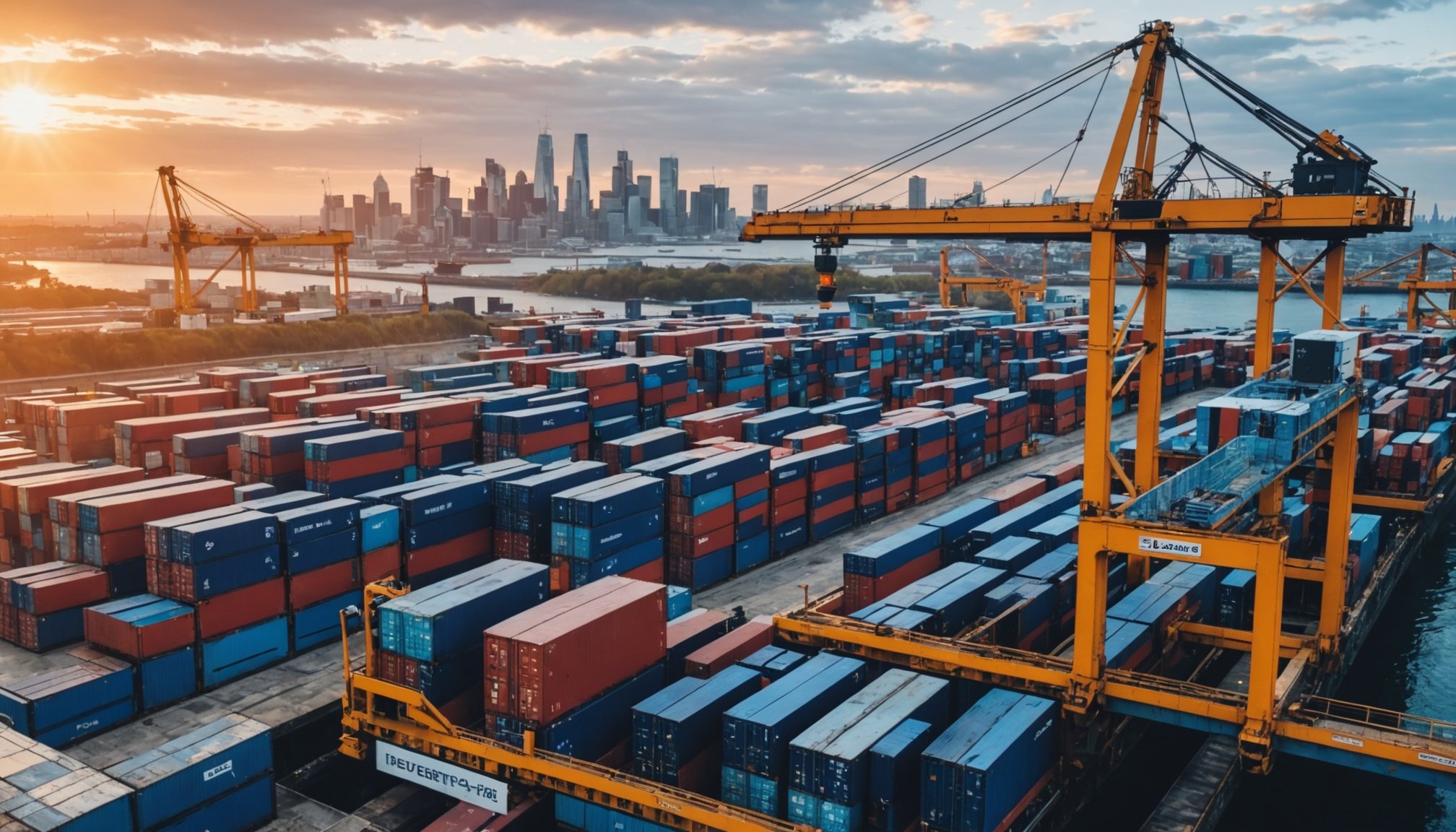Introduction to Blockchain Technology in Supply Chains
Blockchain technology is transforming supply chain management by offering unprecedented transparency and traceability. Initially designed for cryptocurrencies, this technology provides a decentralised, immutable ledger, ensuring data integrity and enhancing trust. Such transparency is critical for both ethical considerations and operational efficiency in supply chains.
An ethical supply chain upholds values like sustainability and fair labour practices, which have become focal points for global consumers. Here, blockchain aids in documenting every transaction and process stage, making it easier for companies to demonstrate compliance with ethical norms.
Additional reading : Revolutionizing UK Education: How AI Predicts and Enhances Student Success
Transparency and traceability fostered by blockchain technology help address some of the most pressing issues in modern supply chains. For example, every transaction recorded on a blockchain is immutable, meaning it cannot be altered once verified. This feature makes it an ideal tool for ensuring firms adhere strictly to ethical standards. Moreover, it eliminates information asymmetry, providing all stakeholders with equal access to the same data.
Importantly, blockchain also helps deter illicit practices by making the manufacturing and distribution process transparent, thereby holding all parties accountable for their actions. As a result, enhanced trust and reliability in supply chains create a competitive advantage for businesses committed to ethical practices.
Also read : Enhancing Guest Loyalty: Cutting-Edge Techniques for UK Hotels to Build Enduring Relationships
Ethical Supply Chain Challenges in the UK
Navigating the landscape of ethical supply chains presents significant challenges in the UK. These challenges stem largely from sustainability hurdles and increasing consumer demands for ethical products. Transparency is of utmost importance and often hard to achieve. Unethical practices can severely undermine consumer trust and tarnish business reputations. The ripple effects of such practices reach far and wide, impacting both profit margins and brand loyalty.
The UK’s regulatory environment governing supply chain ethics is stringent. Companies are required to comply with several regulations, such as the Modern Slavery Act, which mandates businesses to disclose their efforts to eliminate slavery and human trafficking from their supply chains. While these regulations underscore ethical values, they also add complexity to supply chain management.
Sustainability challenges are manifold, including ensuring that entire supply chains adhere to responsible environmental practices. This is where blockchain technology can offer transformative solutions with its ability to ensure transparency, traceability, and accountability across all supply chain stages. With blockchain, firms can significantly reduce their vulnerability to unethical practices, thereby bolstering their brand image and consumer trust in the process. The path to ethical supply chains is no longer elusive. It is within reach for those willing to embrace innovations like blockchain.
How Blockchain Enhances Ethical Supply Chains
Blockchain technology, a beacon of innovation, offers transformative potential for ethical supply chains. Its impact is particularly evident in three key areas: improving transparency, ensuring traceability, and enhancing accountability.
Improving Transparency
Blockchain excels in providing transparency by making every transaction visible and irreversible. This creates a trusted environment where stakeholders can access unaltered records. As a result, companies are better equipped to demonstrate adherence to ethical standards, reducing the risk of reputational damage from opaque practices.
Ensuring Traceability
In terms of traceability, blockchain allows for tracking a product from its origin to the consumer. This is immensely beneficial in maintaining ethical supply chains. Every component’s history becomes accessible, aiding compliance with stringent regulations and fulfilling consumer demand for sustainably sourced products.
Enhancing Accountability
Accountability is fortified through blockchain’s immutable records. These records ensure that no transaction, once validated, can be altered or erased. This aspect deters potential misconduct by creating a digital trail that holds every party responsible for their actions, thereby reinforcing ethical practices throughout the supply chain.
In essence, blockchain offers a robust framework for addressing ethical challenges, focusing on transparency, traceability, and accountability.
Case Studies of Blockchain Implementation in the UK
In the UK, several forward-thinking businesses are harnessing blockchain technology to elevate their ethical supply chains. A standout example is the food industry, where retailers are using blockchain to ensure product authenticity and transparency. By integrating this technology, they successfully track the journey of produce from farm to store shelf, validating claims about organic and sustainable sourcing.
One compelling case is a leading UK supermarket chain that adopted blockchain solutions to tackle counterfeit products. By implementing blockchain, they ensured traceability, allowing consumers to verify the origin of their food and thereby bolstering trust. The outcome was a marked improvement in consumer confidence and strengthened brand reputation.
Lessons from these successful implementations highlight the need for industry stakeholders to collaborate closely during the blockchain adoption phase. Key takeaways include the importance of data accuracy and the necessity for all parties in the supply chain to engage actively.
These case studies serve as a blueprint for other industries aiming to achieve ethical gains. Blockchain’s ability to provide clarity and certainty in supply chains is not merely theoretical; these practical examples from the UK showcase tangible benefits and transformative results.
Step-by-Step Guide to Implementing Blockchain in Supply Chains
Implementing blockchain technology in supply chains can provide remarkable benefits like improved transparency and traceability. Here’s a guide to smoothly adopt this transformative technology.
Assessing Current Supply Chain Practices
Before diving in, conduct a comprehensive assessment of existing supply chain processes. Understand the current landscape, identify inefficiencies and areas lacking transparency. This assessment serves as the foundation for integrating blockchain effectively.
Identifying Blockchain Opportunities
Post-evaluation, pinpoint key areas where blockchain can introduce value. Areas like product verification, ethical compliance, and seamless data sharing are typically ripe for blockchain solutions. Selecting the right opportunities ensures targeted improvements.
Developing a Blockchain Strategy
Crafting a detailed blockchain strategy is crucial. Consider factors such as cost, scalability, and security. The strategy must outline concrete steps for implementation, align with business goals, and include timelines for roll-out. Tools that enable easy access and collaboration across the supply chain should also be factored in.
Engaging stakeholders early and providing necessary training can facilitate smoother operational integration. With the right strategy, businesses can harness blockchain’s potential to create more ethical and efficient supply chains, leading to increased accountability and consumer trust.
Future of Ethical Supply Chains with Blockchain Technology
The future trends of blockchain technology in supply chains are poised to reshape how businesses approach ethics and transparency. As supply chain innovation continues, blockchain evolution is expected to enhance efficiency and trust by providing immutable records.
Predictions suggest blockchain will play a pivotal role in promoting sustainability. By reliably tracking every product’s journey, firms can assure consumers of the ethical sourcing of materials. This capability could become a standard expectation, particularly from environmentally-conscious buyers.
Emerging trends might focus on integrating blockchain with other technologies, like the Internet of Things (IoT), to further optimise processes. Smart contracts may streamline transactions, ensuring automatic compliance with ethical standards.
Potential barriers to adoption include technological hurdles and initial costs. However, enablers such as increased demand for sustainable products and regulatory support could drive widespread acceptance.
Ultimately, blockchain’s future in ethical supply chains appears promising, offering advancements in accountability and transparency. This evolving landscape encourages businesses to consider how blockchain solutions can meet the increasing demand for responsible sourcing. As these innovations unfold, companies prioritising blockchain adoption may gain significant ethical and competitive ground.
Resources for Further Reading and Learning
Educating oneself about blockchain technology in supply chains offers substantial benefits. Numerous resources are available for those eager to deepen their understanding. Recommended books such as “Blockchain Revolution” by Don and Alex Tapscott or “Supply Chain Revolution” by Don Tapscott & Ricardo Ernst, provide insightful perspectives on integrating blockchain in modern supply chain environments. These readings explore the technology’s potential to revolutionise ethical considerations within supply chains.
Articles and websites also serve as valuable sources, with platforms like the Harvard Business Review and the Supply Chain Brain offering in-depth analyses of blockchain applications. For hands-on learning, training programs and workshops focused on blockchain technology are increasingly available in the UK, often hosted by experts in the field. These sessions facilitate practical knowledge acquisition and expose participants to real-world scenarios and challenges.
Engaging with communities and networking opportunities, such as joining UK-based groups like the British Blockchain Association or attending events like blockchain forums, can also prove beneficial. These platforms provide support, share updates on advancements, and connect individuals passionate about ethical supply chains and blockchain innovation.
Resources for Further Reading and Learning
Enhancing your understanding of blockchain’s impact on supply chains can be enriched through a variety of educational resources. Key books such as “Blockchain Revolution” by Don and Alex Tapscott and “Supply Chain Revolution” by Don Tapscott & Ricardo Ernst provide comprehensive insights into integrating blockchain in modern supply chain environments. These works address blockchain’s potential to revolutionise ethical considerations within supply chains.
In addition to books, numerous articles and specialised websites serve as valuable resources. Platforms such as the Harvard Business Review and the Supply Chain Brain offer detailed analyses and case studies on blockchain applications in supply chains. These platforms provide practical knowledge drawn from real-world scenarios.
For hands-on exploration, participating in training programs and workshops focused on blockchain technology can be immensely beneficial. Such programs in the UK, often led by industry experts, enable participants to acquire actionable skills and insights.
Additionally, engaging with communities like the British Blockchain Association or attending events focused on blockchain innovation, provides excellent opportunities for networking. These interactions can further your understanding and keep you updated on the latest advancements in ethical supply chains and blockchain technology.











